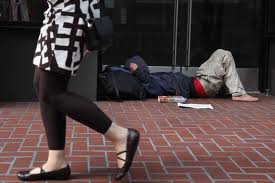Government Grants
Business Grants
Home Owner Programs
Federal Programs
About Us
2016 Cooperative Agreements to Benefit Homeless Individuals (Short Title: CABHI)
The Substance Abuse and Mental Health Services Administration (SAMHSA), Center for Mental Health Services (CMHS) and Center for Substance Abuse Treatment (CSAT), are accepting applications for fiscal year (FY) 2016 Cooperative Agreements to Benefit Homeless Individuals (CABHI) grants.
The purpose of this jointly funded program is to enhance and/or expand the infrastructure and mental health and substance use treatment services of states and territories (hereafter referred to as “states”), local governments, and other domestic public and private nonprofit entities, federally recognized American Indian/Alaska Native (AI/AN) tribes and tribal organizations, Urban Indian organizations, public or private universities and colleges, and community- and faith-based organizations (hereafter referred to as “communities”).
CABHI grants will increase capacity to provide accessible, effective, comprehensive, coordinated, integrated, and evidence-based treatment services; permanent supportive housing; peer supports; and other critical services for:
• Individuals who experience chronic homelessness and have substance use disorders (SUDs), serious mental illness (SMI), serious emotional disturbance (SED), or co-occurring mental and substance use disorders (CODs); and/or • Veterans who experience homelessness or chronic homelessness and have SUD, SMI, or COD; and/or • Families who experience homelessness with one or more family members that have SUD, SMI, or COD; and/or • Youth who experience homelessness and have SUD, SMI, SED, or COD.
Grantees are required to locate permanent housing for all individuals or families who experience chronic homelessness and veterans who experience homelessness or chronic homelessness served by the grant project.
For families or youth experiencing homelessness, grantees are, at a minimum, required to link these populations to the U. S. Department of Housing and Urban Development (HUD) Coordinated Entry system, but are encouraged to permanently house these populations.
Transitional housing is not permanent housing.
The purpose of this jointly funded program is to enhance and/or expand the infrastructure and mental health and substance use treatment services of states and territories (hereafter referred to as “states”), local governments, and other domestic public and private nonprofit entities, federally recognized American Indian/Alaska Native (AI/AN) tribes and tribal organizations, Urban Indian organizations, public or private universities and colleges, and community- and faith-based organizations (hereafter referred to as “communities”).
CABHI grants will increase capacity to provide accessible, effective, comprehensive, coordinated, integrated, and evidence-based treatment services; permanent supportive housing; peer supports; and other critical services for:
• Individuals who experience chronic homelessness and have substance use disorders (SUDs), serious mental illness (SMI), serious emotional disturbance (SED), or co-occurring mental and substance use disorders (CODs); and/or • Veterans who experience homelessness or chronic homelessness and have SUD, SMI, or COD; and/or • Families who experience homelessness with one or more family members that have SUD, SMI, or COD; and/or • Youth who experience homelessness and have SUD, SMI, SED, or COD.
Grantees are required to locate permanent housing for all individuals or families who experience chronic homelessness and veterans who experience homelessness or chronic homelessness served by the grant project.
For families or youth experiencing homelessness, grantees are, at a minimum, required to link these populations to the U. S. Department of Housing and Urban Development (HUD) Coordinated Entry system, but are encouraged to permanently house these populations.
Transitional housing is not permanent housing.
Related Programs
Substance Abuse and Mental Health Services_Projects of Regional and National Significance
Department of Health and Human Services
Agency: Department of Health and Human Services
Office: Substance Abuse and Mental Health Services Admin
Estimated Funding: $19,576,000
Office: Substance Abuse and Mental Health Services Admin
Estimated Funding: $19,576,000
Obtain Full Opportunity Text:
2016 Cooperative Agreements to Benefit Homeless Individuals (Short Title: CABHI)
Additional Information of Eligibility:
• States and territories; o Eligible state applicants are either the State Mental Health Authority (SMHA) or the Single State Agency (SSA).
However, SAMHSA’s expectation is that both the SSA and the SMHA will work in partnership to fulfill the requirements of the grant.
To demonstrate this collaboration, applicants must provide a letter of commitment from the partnering entity in Attachment 5 of the application.
If the SMHA and the SSA are one entity, applicants must include a statement to that effect in Attachment 5.
• Local governments; and • Communities, which includes other domestic public and private nonprofit entities (e.g.
federally recognized AI/AN tribes and tribal organizations, Urban Indian organizations, public or private universities and colleges, and community- and faith-based organizations).
Tribal organization means the recognized body of any AI/AN tribe; any legally established organization of AI/ANs which is controlled, sanctioned, or chartered by such governing body or which is democratically elected by the adult members of the Indian community to be served by such organization and which includes the maximum participation of AI/ANs in all phases of its activities.
Consortia of tribes or tribal organizations are eligible to apply, but each participating entity must indicate its approval.
A single tribe in the consortium must be the legal applicant, the recipient of the award, and the entity legally responsible for satisfying the grant requirements.
SAMHSA seeks to further expand the impact and geographical distribution of the CABHI-States program and the Grants to Benefit Homeless Individuals-Services in Supportive Housing (GBHI-SSH) program across the nation.
Therefore, grantees that received an FY 2014 (SM-14-010) or FY 2015 (TI-15-003) CABHI-States award or a GBHI-SSH award in FY 2014 or FY 2015 (TI-14-007) are not eligible to apply.
Full Opportunity Web Address:
http://www.samhsa.gov/grants/grant-announcements/sm-16-007
Contact:
Eileen BermudezOffice of Financial Resources, Division of Grants ManagementSubstance Abuse and Mental Health Services Administration1 Choke Cherry RoadRoom 7-1091Rockville, Maryland 20857(240) 276-1412
Agency Email Description:
FOACSAT@samhsa.hhs.gov
Agency Email:
FOACSAT@samhsa.hhs.gov
Date Posted:
2016-01-14
Application Due Date:
2016-03-15
Archive Date:
2016-04-14
Social Entrepreneurship
Spotlight
When it Comes to Social Enterprises, Failure is the Best Platform for Innovation

In the world of social enterprises, failure is a cringe-worthy moment nobody wants to talk about. But, social entrepreneurs can benefit from their failures.

